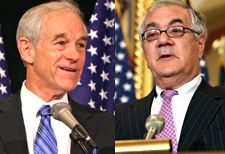
As we predicted earlier this month, a bipartisan group of U.S. House members, spearheaded by Barney Frank (D-Mass.) and Ron Paul (R-Texas) has made good on its promise to introduce federal legislation that would leave states free to do whatever they want about marijuana without interference from the Feds. Co-sponsors include John Conyers (D-Mich), Steve Cohen (D-Tenn), Jared Polis (D-Colo), and Barbara Lee (D-Calif).
This is all fairly ho-hum, given the extreme unlikelihood of the bill’s passage, but it does mark the first legislation ever introduced in the U.S. Congress to end federal prohibition of cannabis, stripping the federal government of its ability to regulate, tax, or control the marijuana market. The Feds would still have the power to make trouble for interstate smugglers of pot, since federal commerce prohibitions would still apply, but they would be prohibited from arresting people who grow, use or sell cannabis in states that allow it. Rep. Frank made an earlier run at this in 2008, with a bill that would have decriminalized the possession of up to 100 grams of marijuana. Bill Piper, Drug Policy Alliance national affairs director, told the San Jose Mercury News the new bill goes further, by keeping the federal government out of local sales and distribution channels.
Rep. Lee released a statement which said in part: “The human cost of the failed drug war has been enormous—egregious racial disparities, shattered families, poverty, public health crises, prohibition-related violence, and the erosion of civil liberties. And of course the cost in dollars and cents has been staggering as well—over a trillion dollars spent to incarcerate tens of millions of young people. I co-sponsored this bipartisan legislation because I believe it is time to turn the page from this failed drug war.”
